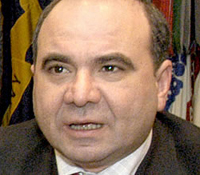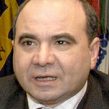
ZHVANIA’S DEATH STILL CONTROVERSIAL TOPIC IN GEORGIA
Publication: Eurasia Daily Monitor Volume: 2 Issue: 106
By:

The almost-shelved investigation into the February 3 death of Georgian Prime Minister Zurab Zhvania has resurfaced and may yet damage President Mikheil Saakashvili’s government. Saakashvili did not mention Zhvania’s death when he reviewed the troubles Georgia has faced in 2005 when he addressed the crowd in Tbilisi on May 10 during U.S. President George W. Bush’s visit to Georgia. Reportedly, Saakashvili deleted that section from his speech. Bush, however, paid a special tribute to the late prime minister’s role in building democracy in Georgia and later met with Zhvania’s family. Some analysts saw this step as a challenge to Saakashvili.
On May 20, the “202” television company broadcast a 20-minute long film that investigated the circumstances surrounding Zhvania’s death. Titled “Without a Bullet,” the documentary grew out of an investigation by a group of independent journalists known as “Studio Reporter.” The documentary focused primarily on the facts that contradicted the official version.
Vakhtang Komakhidze, leader of Studio Reporter, said that his team had started their investigation after law-enforcement officials announced that Zhvania and his associate Raul Usupov died of carbon monoxide poisoning due to a faulty space heater (see EDM, February 3 and April 6). Komakhidze claims that the Prosecutors’ Office is hiding information and that no genuine investigation is underway. “They are simply dragging out [the investigation] and hiding information to avoid undesirable questions.” According to Komakhidze, none of the major national television companies dared to broadcast the film, and he was forced to bring the film to television 202, which broadcasts only in Tbilisi. “Major media outlets are controlled by the authorities,” he commented.
The journalists used data from the FBI’s efforts to recreate the death scene. They discovered a discrepancy between the original FBI report and its Georgian translation, which was then repeated by Georgian officials. The FBI reported that, in their experiment, the allegedly malfunctioning gas heater did not give off carbon monoxide levels above the allowable parameters established by the American National Standards Institute. However, the Georgian translation stated that the concentration did exceed the parameters and was lethal. Furthermore, the FBI experiment found that the concentration of oxygen in the apartment during the three hours Zhvania and Usupov were there was equal to 18.8%, not a lethal level. Meanwhile, the Studio Reporter journalists refer to some Russian experts who have argued that Zhvania might have been poisoned by pentacarbonyliron, a substance in the arsenal of the Russian special services that causes symptoms identical to asphyxiation by carbon monoxide.
The investigation revealed that on the day Zhvania and Usupov died, gas pressure in the neighborhood where the apartment was located suddenly increased. According to the Tbilisi gas service, such an increase could only be accomplished using a regulator located in a special locked booth. However, the investigation detected that the lock on the booth was broken.
The investigation also uncovered unusual behavior by Zhvania’s bodyguards that day. An interview with one of Zhvania’s guards, Mikheil Dzadzamia, recorded by a hidden camera and shown in the film, shows that he violated regulations. He waited an unusually long time before checking on Zhvania that night; had he entered the apartment sooner he might have saved Zhvania’s life.
Relatives of both Zhvania and Usupov increasingly doubt the objectivity and accuracy of the official investigation. Usupov’s relatives, who thoroughly examined his corpse, claim to have detected suspicious injection marks on his chest. Shalva Natelashvili, leader of the opposition Labor Party, claims that Zhvania was shot dead and then the bullet hole was filled with paraffin.
On May 23, Zhvania’s brother, Goga Zhvania, stated in a televised interview that he is “now sure” that his brother was assassinated, based on information gathered by the family’s private investigators. He said Georgian investigators misrepresented the results of the FBI probe either deliberately or because of incompetence. Zhvania’s brother and widow were particularly concerned by the absence of fingerprints on two objects in the apartment, discrepancies in the testimonies of Zhvania’s bodyguards, and their behavior during and after the accident. According to Zhvania’s widow, Nino Zhvania, after taking Zhvania’s corpse to the hospital, Zhvania’s chief bodyguard took keys from Zhvania’s pocket, opened Zhvania’s personal safe, and took all the documents dated 2004.
On May 28, Saakashvili held a two-hour meeting with Zhvania’s widow and brother, who raised some troubling questions. According to Nino Zhvania, Saakashvili agreed to let European specialists take part in the investigation. However, Georgian Parliamentary Chair Nino Burjanadze rejected demands from opposition factions to open a separate investigation.
Zhvania’s case has suspiciously resurfaced following the recent assassination of Levan Samkharauli, head of the forensics department at the Ministry of Justice. Officially, Samkharauli was gunned down by a deranged classmate, who immediately committed suicide. Some analysts believe that Samkharauli took to the grave all the sensitive information about forensic examinations of Zhvania’s corpse, data that he possessed thanks to his position.
Week’s Palette newspaper interviewed State Minister for European Integration Giorgi Baramidze, one of Zhvania’s closest friends, about the renewed interest in Zhvania’s case. Baramidze openly doubted the fairness of the official investigation, declaring, “I want to know whether that was an accident or an assassination.”
(Georgian Times, May, 16, 26; Civil Georgia, May 26; Akhali, 7 Dge, May 27; Akhali Versia, Resonance, May 23; Caucasus Press, May 24; TV-202, May 20, 23; TV-Rustavi-2, TV-Imedi, Gazeta.ru, RIA-Novosti, May 28-29; Week’s Palette, May 30)




